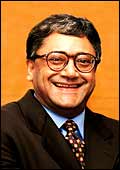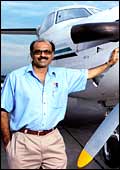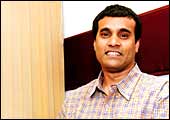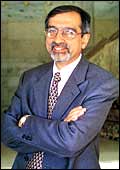 |
 |
NEELAM
DHAWAN, 42
Managing Director Microsoft India
Dhawan is one of the few women CEOs in the country; the lady,
asserts one headhunter, is in the fast lane; the highest paid
woman executive outside of banking in India with a salary
comfortably into eight figures |
RAGHU
PILLAI, 47
Former CEO RPG Retail
Pillai is said to be juggling offers from Pantaloon and a
private equity fund (the buzz is, he will probably go with
the first). Both offers, talk in the executive search circuit
says, are in the region of Rs 1.3 crore a year |
 RAVI RAVI
SINGHVI, 26
IIM-A, Class of 2005 HSBC
Singhvi represents an entire generation of B-school pass-outs
that is attracting top dollar (literally) from foreign recruiters.
The specifics in this case: an annual salary of $150,000 (Rs
66 lakh) for a posting in London |
There are
few pleasures as vicarious and as stimulating as looking at someone
else's payslip, typically a dot-matrix printout that serves as
the financial summary of an individual's value to an organisation.
India, then, should be in the throes of ecstasy today. Salaries
are up, across levels, and those of senior managers are nudging
the magical Rs 1-crore-a-year mark, once considered the exclusive
domain of high-profile executives (the kind that gets written
about in magazines such as this one) and CEOs.
The individuals concerned must be smiling
all the way to the bank but their public response is a mix of
embarrassment and touchiness, with most refusing to speak to this
magazine, and others agreeing to discuss anything but their salaries.
Thus Sandeep Sahney, the 41-year-old head of branded formulations
(for all markets other than the us and Europe) at Dr Reddy's Laboratories-he
signed on two months ago from Eli Lilly India where he was Director
(Sales and Marketing)-says that it was the challenge and not the
money that influenced his decision. He is reluctant to talk numbers
and will only say that his new salary is 30 per cent higher than
his old, although the buzz in the market is that he earns around
Rs 80-90 lakh a year. And Rajiv Verma, the CEO of ht Media Ltd
(the company that owns Hindustan Times), insists that it was the
challenge and the fact that he was being offered a position in
a happening sector in India-he was a true global resource, having
worked in Nestlé's and Whirlpool's operations in other
parts of the world-that encouraged him to sign up with the company
in October 2004. Verma is, again, not at all keen to talk numbers
but whispers in the exec-search trade put his salary at around
Rs 2 crore-a-year.
Indeed, execs at headhunting companies (some
insist they be called HR consultants focussed on recruitment;
others are happy with the more prosaic search firms) rattle off
a list of executives who have recently moved jobs and the impressive
salaries at which they have moved. R.S. Prasad moved from Dr Reddy's
to head Chennai-based Orchid Chemicals and Pharmaceutical's formulations
business at a salary of Rs 1.5 crore a year; Lloyd Mathias left
Pepsi where (page 53) he was Executive Vice President (Marketing),
to head the marketing function at Motorola India at a salary significantly
higher than the Rs 50-60 lakh-a-year he was earning at the beverages
major; Sanjay Viswanathan moved from igate (he was head of Europe)
to GECIS as Managing Director, Europe, at a salary of $300,000
(Rs 1.32 crore); and Padma Ravichander signed on as head of Perot
Systems India (from Oracle) at a salary of $325,000 (Rs 1.43 crore).
"Indian salaries, especially for senior managers, is fast
racing towards the $250,000 (Rs 1.1 crore) mark," says Venkatesh
Shastry, Associate Director, Stanton Chase, a headhunting firm.
"This is comparable to the compensation in the us for middle-to-senior-level
positions." The Indian salaryman has arrived.
AVIATION
On Wings Of Growth |
 |
| Air Deccan's Gopinath: It's tough
to 'ground' staff |
Airline industry execs would
like everyone to believe that the job market relevant to
them is not as overheated as it is made out to be. However,
rumours of a no-poaching agreement between Air Deccan and
Kingfisher Airlines, and Air Sahara's decision to sue SpiceJet
for poaching pilots tell a different story. Still, with
most pilots already being well paid, the real salary boom
is happening for ground staff with new airlines paying premia
of anything between 50 and 100 per cent. "I have already
lost several members of my ground staff," says Captain
G.R. Gopinath, Managing Director, Air Deccan (itself only
three years old). "They have joined new carriers at
salaries that are sometimes double what they used to earn."
There's unlikely to be a shortage of ground staff, though,
like there is for pilots; Sunil Arora, the outgoing MD of
Indian Airlines, is convinced that even this is a temporary
phenomenon "because there are more Indian pilots coming
through". "Salaries increased 12 years ago when
several airlines entered the market," he adds, "and
then, when most collapsed, there was a glut of trained staff."
With the economy on a (modest) roll-there's a direct correlation
between economic growth and passenger traffic-and Air Deccan
not imploding as many expected it to (proving, in the process,
that a low-cost airline can be viable in India) that seems
a remote possibility.
-Kushan Mitra
|
FINANCIAL SERVICES
More People; Higher Pay |
 |
| ICICI's Ramkumar: Bank jobs galore |
In 2004-05, the Indian banking
industry grew by 15 per cent; the corresponding figure for
the asset management (mutual fund) industry was 9 per cent;
and for insurance, 15 per cent. Growth engenders demand
for people (which, in turn, encourages companies to loosen
their hold over purse strings), with Ramkumar K., Senior
General Manager, ICICI Bank, predicting that some 35,000
people will be hired by the financial services industry
this year (banking alone will account for 25,000, and ICICI
Bank, 12,500). The sector is also open to poaching by IT
enabled services firms that are focussed on the financial
services space (most are). Ramkumar stresses that ICICI
Bank "does not compete in the employment market on
(the basis of) salary" but there are enough firms that
do, especially those seeking a toe-hold in booming markets
such as housing finance, asset management, investment banking
and broking or new ones such as pension funds. "Salaries
in the banking business have increased by around 20-25 per
cent over the last two years," says Arun Das Mahapatra,
Managing Partner, Heidrick & Struggles. This year promises
to be no different.
-Priyanka Sangani
|
ENGINEERING/MANUFACTURING
Crucial Cogs Cost More |
 |
| Jindal Steel & Power's Joseph:
Experience pays |
You know the salary boom is
well and truly on when companies in the engineering and
manufacturing sectors start battling high attrition rates.
The two, after all, are sectors where "human capital
isn't the only cog in the wheel, and people are not the
product", according to N.N. Akhori, Vice President
(Human Resources Management), Hero Honda. Surprisingly then,
attrition in the engineering and manufacturing industries
is up from 7-9 per cent two years ago and is nudging the
15 per cent mark; it is a mere few percentage points lower
in IT services. That could explain why salaries in the two
industries increased by an average of 15 per cent last year
and will, by a similar amount this year. The number is higher
in the case of some companies; at Jindal Steel and Power,
for instance, salaries have increased by an average of 24-28
per cent over the past few years. "Three years ago
an individual with eight to 10 years experience would earn
Rs 30,000 a month; today the same person would earn Rs 80,000,"
says Joseph John, Deputy General Manager (HR), Jindal Steel
and Power. One reason for the explosion in salaries is that
companies in manufacturing and engineering are doing well;
another is that the two sectors are a happy hunting ground
for firms operating in areas such as IT services, consulting,or
financial services looking for the ever-elusive domain skills.
-Kushan Mitra
|
The Making Of The Boom
India Inc. is on a roll. In 2004-05, a sample
of 1,528 companies increased their revenues 19.37 per cent and
net profits 28.74 per cent over the corresponding figures for
2003-04. "This is the first time that all sectors of the
economy including traditional laggards such as steel and textiles
are doing well," says Sanjay Kapoor, Partner, Amrop International,
a headhunting firm, proffering one reason for increasing salaries.
The average increase in salaries across industries, say HR consultants,
is around 15 per cent this year. The number is higher in sectors
such as pharmaceuticals (25 per cent) and functions such as HR.
"HR is one area where there is a huge demand for people,"
says M.S. Rangesh, Head, Orchid. The pharmaceuticals-bit doesn't
surprise Sonal Agrawal, Director, Accord India, a headhunting
firm, who believes that the demand-supply imbalance is most acute
(and consequently, the phenomenon of stratospheric hikes in salary
most prevalent) in sectors that are "fast growing and display
structural imbalances". That would include it services, business
process outsourcing, pharmaceuticals, retail and airlines, which
are either experiencing sudden unexpected growth or facing a shortage
of people with either the right kind of experience or the requisite
skills, or both. In some cases, there is a time-dimension to be
considered as well; for instance, media companies rushing to launch
editions or channels by a certain deadline cannot afford to wait
for the right talent to fall into their laps. "Their business
plans would then get moved by six to 12 months," explains
Rekha Jacob Koshy, National Practice Head (Entertainment, Media
and Communications), Accord India, "and that is something
no player can afford."
IT-ENABLED SERVICES
The Best Of Both Worlds |
 |
| EXL's Dhawan: Seeking performers |
Or should that be worst? In
some ways, the Indian ITEs or business process outsourcing
(BPO) industry has everything going for it: a workforce
of 350,000, set to touch a million by 2007-08 and an annual
growth rate of 60 per cent. And in some ways, it is an HR
manager's nightmare: attrition rates average around 35 per
cent; there is a significant mismatch between demand and
supply; and there are few competent senior managers available.
"Each new player who enters the market (to start a
BPO) plays the compensation card," says Rahul Varma,
Director (HR), Accenture. Given the industry's age (it is
still a toddler), it is hard to find people with experience,
and new entrants are more than willing to pay a premium
for whatever experience is available. That (the scarcity
of experienced hands) motivates people from the IT services
and financial services sectors to look for greener pastures
in ITES where they, more often than not, find them. Even
at the junior level where, according to Deepak Dhawan, Vice
President (HR), EXL Service, "we look for people with
the drive to perform and the ability to think on their feet",
salaries have increased by around 15 per cent a year over
the past few years. And while employees celebrate their
huge hikes, companies are beginning to lose sleep over wage
inflation and the consequent erosion of the cost advantage
India currently enjoys over other countries.
|
IT SERVICES
Paying For Experience |
 |
| Satyam's Hari: Specialisation
pays |
It smells like old times,"
says Pratik Kumar, Corporate Vice President (HR), Wipro.
Kumar is referring to the pre-2001 era when IT services
companies lavished half-yearly, sometimes quarterly hikes,
on their employees (not across the board, though). The phenomenon
of quarterly hikes may not be back (at least, not across
the industry), but if there is one sector that embodies
the boom in salaries, it is IT services. One reason for
this is the sheer number of people companies have been hiring.
Over the past year, TCS, Wipro and Infosys have each hired
over 10,000 people. And tech multinationals such as Accenture
(from 1,000 employees three years ago, the firm has increased
the strength of its workforce to over 13,000), IBM and EDS
haven't been idle either. The predictable outcome: a scramble
for talent.
In other sectors, that may have resulted in a spurt in
salaries at the entry-level; in IT services, says Ajit Issac,
Managing Director, Adecco People One, a staffing firm, "it
is primarily people in the middle and junior (not entry)
levels that have seen a (significant) hike". Bhaskar
Das, Vice President (HR), Cognizant Technology Solutions,
admits that salaries at the entry level have remained flat
over the past two years. And T. Hari, Sr Vice President
(HR), Satyam Computer Services, points out that although
salaries have increased by around 12-15 per cent across
the organisation, at the middle-management level, they have
increased 18-20 per cent. The large number of engineering
graduates India turns out each year (184,347 at last count
by NASSCOM estimates) is one reason for this. Another, explains
Hari, is "the high demand for specialised skills".
Thus, experienced technical architects, integration managers,
change managers, programme managers and domain specialists
are in demand.
-Venkatesha Babu with E. Kumar
Sharma
|
PHARMACEUTICALS
The Magic Pill |
 |
| Dr Reddy's Chakraborty: No poaching,
but... |
The magic pill (in case you
are wondering), something that can promise an increase in
salary of 50 per cent or more, is available to individuals
who are anything between a manager and a vice president
in a pharmaceutical firm, and have skills in areas such
as clinical research, new product development, quality,
or marketing (generics especially, which are generic versions
of off-patent drugs) in regulated markets such as the US.
"It is demand from Indian pharma players entering regulated
markets, particularly with generics and speciality drugs,
that is driving the salaries boom," says Ishwar Balchandani,
Executive Director, Omam Consultants, an HR consulting firm
focussed on recruitments. Thus, even Dr Reddy's Laboratories,
which, according to Saumen Chakraborty, Executive Vice President
and Global Chief of HR, "does not poach and does not
offer fantastic hikes", has had to relax the rules
a bit in functions such as R&D and regulatory affairs.
In these, says Chakraborty, "the whole thing is about
negotiation and what one presents as his value and what
the employer perceives as it (the value)".
-E. Kumar Sharma
|
REAL ESTATE
Professional, Organised And Ready To Fly |
 |
| CB Richard Ellis' Magazine: Getting
jobs in real estate is now tougher |
Two years ago, when Kundan Verma,
now head of HR at the Ansal Group, moved from the liquor industry
to real estate, most people thought there was something wrong
with him. From being an industry only in name, real estate
is today, professional, organised, and with the government
relaxing rules regarding foreign direct investment in the
sector, ready to fly. By some estimates, salaries in real-estate
firms have increased by between 20 per cent and 25 per cent
over the last year. "The new companies have improved
the way the sector works," says Anshuman Magazine, Managing
Director, CB Richard Ellis, a real-estate consultancy. That
has led to an increase in demand for engineers, lawyers, finance
pros, even marketing execs. And although real estate firms
are expanding to cities outside the metros (the Ansal Group,
for instance, is increasing its reach to include Meerut, Ludhiana
and Jalandhar) to tap demand for their services-the real estate
market is booming across the country, in case you hadn't noticed-they
aren't relaxing the stringent recruiting norms they have recently
put in place. "No one can walk into a job anymore,"
says Verma. "There's manpower planning and forecasting,
detailed job descriptions, reference checks and, finally,
competency-profiling." |
Much of this has already happened in sectors
such as telecommunications, media, pharmaceuticals, and it and
IT services (there is a ripple effect across sectors too, but
more on this later) and Vijay Kashyap, Vice President (HR), Shoppers'
Stop, can see it coming in retail too. "With foreign direct
investment being allowed (it hasn't yet been, but is more a question
of when than if), there will be greater upward pressure on salaries
with more players chasing the same talent pool." Apart from
industrial growth, increased competition and the emergence of
new sectors, salaries are being pushed North by another phenomenon:
that of senior executives in India being tapped for regional roles
and the arrival of India as (possibly) the next big economic destination.
"This would entail a different alignment of talent and compensation,"
says Atul Vohra, Managing Partner, Transearch India, a headhunting
firm. It already has.
RETAIL
Fuelling The Rs 12,10,000- crore Binge |
 |
| Shoppers' Stop's Kashyap: Dipping
into a limited pool |
That (Rs 12,10,000 crore)
is the size retail consulting firm KSA Technopak puts on
organised retail in India by 2010. Retail has been the next
big thing for sometime; apart from existing players such
as RPG (Spencer's, MusicWorld), Shoppers' Stop, Pantaloon
(Big Bazaar), and Trent (Westside), there are a clutch of
foreign companies (read: Wal-Mart and the like) waiting
to enter the country once the government relaxes rules regarding
foreign direct investment in the sector. When that happens,
it will only exacerbate the existing manpower crunch in
the industry (although FMCG companies are a happy hunting
ground; RPG's Sanjeev Goenka has just poached Jeetu Mehta
from HLL to serve as the Chief Operating Officer of the
group's retail business). "This is what happens when
you have lots of people suddenly chasing a limited talent
pool," says Vijay Kashyap, Vice President (HR), Shoppers'
Stop, referring to the phenomenon of companies willing to
pay anything to attract that all-that-rare talent. "The
retail industry is facing a shortage of people, especially
in areas such as mall management and merchandising,"
says Sonal Agrawal, Senior Director, Accord India, a headhunting
firm. "It will create one million jobs by 2010."
-Priyanka Sangani
|
TELECOM
India's Hottest Sector (Need We
Say More) |
 |
| Bharti's Nayar: The boom won't
end anytime soon |
Telecom, India's most happening
industry, provides a good illustration of how salaries can
explode with increments remaining in the modest 15 per cent
to 18 per cent range. "Everybody is hiring from everybody
else," says an executive at a large telecom equipment
firm. "Attrition rates are going through the roof and
people are leaving for salaries that are sometimes double
what they used to earn." That's an assessment that
Steve Correa, Corporate HR Head, Hutch, agrees with. "Too
many companies are chasing too few people and only smart
companies have been able to keep wages and associated costs
in check." And Bharti Tele-Venture's Executive Director
and Acting Head, HR, Anil Nayar sees salaries continuing
to rise in the sector as long as it contnues to grow.
-Kushan Mitra
|
THE
EXPAT FACTOR
The difference between expat and local
salaries is shrinking. |
 |
| SpiceJet's Winders: It pays to
be an expat |
Expats earn more, and they
should. "It is only fair that companies pay a premium
not just over the Indian salary but also the home salary
to attract expats," says Mark Winders, CEO, SpiceJet,
himself an expat. However, over the past two years, the
gap between Indian and expat salaries has narrowed: from
a premium of 100 per cent earlier, expats now attract a
premium of around 30-35 per cent. Part reason for the narrowing
gap is the steep rise in Indian salaries. Another is the
status of India as a hot emerging market that has, explains
Gangapriya Chakraverti, Head (Compensation Practice), Mercer
Human Resources Consulting, "ensured that many expatriates
now want to be part of the excitement". She adds that
even in these cases, the salaries are at a premium over
"local levels". Then, expat salaries are the same
as domestic ones only in the First World.
|
Why Numbers Don't Tell The Entire Story
Numbers-a 15 per cent, even a 25 per cent
or 30 per cent hike in salaries doesn't really qualify as a boom-don't
really tell the story. That's because India Inc. (the definition
includes multinationals operating in India) has discovered the
advantages of hiring across sectors (the ripple effect). For instance,
telecom firms often hire marketing pros from fast moving consumer
goods firms; while the salaries these people are hired at may
be par for the course as far as telecom is concerned, they would
be significantly higher than what they were earning (sometimes
double). Such nuances apart, most people expect the phenomenon
of rising salaries to continue. As Roland Sequeria, Vice President
and Head of HR at Tata Power, puts it, "As long as India
continues to be an attractive destination for global companies,
the market (for talent) will continue to remain competitive."
"Will salaries continue to rise?" asks Anil Nayar, Executive
Director who is overseeing the HR function at telco Bharti Tele-Ventures
while it identifies a new person for the job. "If the telecom
market and the economy continue to grow, they will."
Hot! Hot! Hot!
These pros demand a premium because there
aren't enough of them. |
HUMAN RESOURCES DEVELOPMENT MANAGERS
In one of those cruel ironies, India Inc. is waking up to
the fact that apart from suffering a limited pool of potential
recruits, there simply aren't enough recruiters to go around.
Apart from hurting corporates, says K. Pandia Rajan, Managing
Director, Ma Foi, a staffing and headhunting firm, this means
firms such as his have it tough.
FINANCE & ACCOUNTING PROS
Why? Because every segment of retail finance is booming,
foreign financial services majors are entering India with
aggressive plans, and companies are feeling the pressure
to focus on transparency and corporate governance. Now,
where does that leave companies seeking to fill slots in
their corporate finance function?
MERCHANDISERS, MALL MANAGERS, SOURCING
SPECIALISTS
If organised retail is a science (the companies in the business
swear it is), people who belong to any of these three categories
are the equivalent of research scientists. Not surprisingly,
there aren't too many of any of the three types floating
around. "People are scouting abroad for experienced
people," says Dharmesh Jain, Chairman, Nirmal Lifestyle,
a Mumbai-based mall developer.
IT PROJECT MANAGERS
The divas of the IT services space, there are few project
managers around who can manage a project involving 500-800
people. "Finding the type is harder for MNCs that have
recently come here to leverage India," says Gautam
Sinha, CEO, TVA Infotech, a Bangalore-based HR firm. "Domestic
firms get by because they have grown and nurtured talent
internally."
SALES & MARKETING PROS
Consumer confidence (see on top of the world on page 88)
is on an all-time high; there is a real-estate boom on;
there's a passenger-car boom on; and consumer durables aren't
doing too badly either. "We usually hire sales and
marketing people from other auto companies," says G.S.
Ramesh, Senior Vice President (HR), Hyundai Motor India.
"Given how fast we are growing, we have also started
tapping other service-oriented industries."
 PILOTS
AND AIRCRAFT MAINTENANCE ENGINEERS PILOTS
AND AIRCRAFT MAINTENANCE ENGINEERS
The going rate for the captain of an airbus 320 or boeing
737 is Rs 3-4 lakh a month. That for an entry-level aviation
engineer, Rs 50,000-60,000. And domestic airlines have to
compete with international carriers that, according to Captain
G.R. Gopinath, Managing Director, Air Deccan, "pay
in foreign currency, have better pay scales and tend to
fly bigger planes (the bigger the plane, the more the pilot
or engineer is paid)".
R&D AND CLINICAL RESEARCH PROS
"There are around 40 research teams in the country
that need to be rebuilt across 25 companies and a dozen-odd
research hotshops with each needing around 30-40 people,"
says R. Suresh, Managing Director, Stanton Chase, a headhunting
firm. That's 1,000 people India doesn't have right now.
PRIVATE EQUITY PROS, RESEARCH ANALYSTS
AND FUND MANAGERS
The stock market is on a roll (face it, although the sensex
is a trifle volatile it hasn't seen 6,000 in a long while),
foreign institutional investors (FIIs) cannot get enough
of India, and existing asset management firms are launching
new schemes and new ones are entering the market. Says Paras
Adenwala, an investment advisor, "There is definitely
a shortage of good people in the market, especially on the
investment side, which isn't surprising given the number
of new players."
|
DO
CEOs EARN MORE?
They do, and thanks to incentives the
gap between CEO and senior manager pay is widening.
|
|
CEOs, says one HR consultant,
earn, on an average, between 25 per cent and 30 per cent
more today than they did a year ago. Much of this, however,
can be attributed to performance incentives (and with India
Inc. continuing to outperform-the net profits of 1,528 companies
increased some 28.74 per cent in 2004-05 over 2003-04-that
shouldn't surprise anyone). "It is this component that
is the real differentiator between the salaries of CEOs
and other senior managers," says K. Pandia Rajan, Managing
Director, Ma Foi, a staffing and executive search firm.
For instance, in the pharmaceuticals sector, the performance-pay
component in CEO salaries is 30 per cent; in contrast, that
for senior managers is a mere 5 per cent. The head-tail
ratio (HR-speak for ratio of CEO salary to that of the junior-most
manager in the organisation) tells a similar story. From
15:1 a decade ago, it today stands at 100:1 for private
sector firms and 35:1 for public sector ones. Deepak Gupta,
Country Head and Managing Director, Korn/Ferry, a headhunting
firm, has no issues with that. CEOs, he explains, are becoming
global resources and that warrants global compensation standards
for them. Still, 100:1 seems a bit much.
|
That may be good news for employees, but
for companies it presents a unique set of challenges. Captain
G.R. Gopinath, Managing Director, Air Deccan, offers the instance
of his Deputy Airport Manager at Bangalore who left for a rival
that promised to double her pay from Rs 30,000 to Rs 60,000, ruing
the impact it has on his costs. "It is difficult to juggle
employee costs and low fares," admits Rubi Arya, Head (HR),
Kingfisher Airlines. "Whether one is high cost or low cost,
the talent pool remains the same." Companies usually address
such problems by offering yearly bonuses; apart from keeping immediate
costs low, says Arya, these "serve the cause of retention."
As salaries continue to increase, the average
duration an employee (even at the senior levels) spends in a company
is coming down. In sectors such as telecom, this statistic is
now an unimpressive two years. Companies do not (and should not)
have anything against hiring such executives. However, as Bimal
Rath, Head (HR), South Asia, Nokia, points out: "The difficult
part is weeding out people who are moving jobs just for the money,
and there are a lot of such people." There are also some
people who believe that if salaries spiral out of control, India
could lose its edge in sectors such as it and it-enabled services.
"It is important to give people the salaries they deserve,"
says Ramkumar K., Sr GM, ICICI Bank, "but we need to make
sure that we do not run the risk of becoming unproductive."
Should that happen, warns Ramkumar, jobs will move out of the
country. "The competitive gap between remuneration and value
needs to remain for the economy to remain productive," he
adds. That's a sound theory. However, things do not always work
that way in practice. "With limited experience available,
poaching on the basis of compensation alone has hiked salaries
in industries where skill sets are portable," says Mohit
Mohan, Sr Vice President, Gilbert Tweed Associates, a headhunting
firm. Then, as Arun Das Mahapatra, Managing Partner, Heidrick
& Struggles, another headhunting firm, would have it, "To
say salaries are going through the roof would be wrong. They are
realistic." Which is probably why this is the best time to
be a salaryman in India.
-additional reporting by
Venkatesha Babu, Rahul Sachitanand, Kushan Mitra,
Priyanka Sangani and E. Kumar Sharma
|






 RAVI
RAVI












 PILOTS
AND AIRCRAFT MAINTENANCE ENGINEERS
PILOTS
AND AIRCRAFT MAINTENANCE ENGINEERS